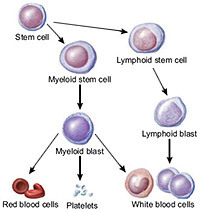
one of three types of
mature blood cells.
Credit: National Cancer
Institute.
Acute myeloid leukemia (AML) is a heterogenous malignancy that stems from the production of abnormal white blood cells, platelets, or red blood cells in the bone marrow. It is estimated that 19,520 new AML cases will occur in the United States this year. While chemotherapy remains the standard-of-care for AML treatment, minimal improvements in patient outcomes have been identified. As a result, targeted therapies are currently being tested, however targeting genetic mutations such as FMS-related tyrosine kinase 3 (FLT3) has led to secondary mutations, FLT3 inhibition, and resistance. Dr. Anupriya Agarwal and her research team at Oregon Health and Science University (OHSU), in collaboration with CPTAC investigators Drs. Karin Rodland, Tao Liu, and Samuel Payne of Pacific Northwest National Laboratory and Brian Druker of OHSU, evaluated the role of IL-1 receptor-associated kinase 1 (IRAK1) in AML. Additionally, the investigators assessed the inhibitory activity of pacritinib, a multi-kinase inhibitor, on IRAK1 in AML.
As reported in the journal Leukemia, the investigators demonstrated that overexpression of IRAK1, an essential mediator of innate immunity and inflammatory responses, provides a survival signal to AML cells. Pacritinib showed robust sensitivity and inhibited the growth of primary AML cells by blocking kinases such as FLT3, JAK2 (Janus kinase 2), IRAK1, and CSF1R (Colony stimulating factor 1 receptor) relative to single agent kinase inhibitors. Investigators performed global phosphoproteomics analysis and found that pacritinib sensitivity correlated with baseline phospho-ERK1/2 (also known as mitogen-activated protein kinase 3/ mitogen-activated protein kinase 1) activation and GSK3β (Glycogen synthase kinase-3 beta) inactivation in several resistant patients. These results provide a rationale for further exploration of IRAK1 as a target for intervention with pacritinib, and for clinical trials for its potential use in AML and other neoplastic disorders associated with IRAK pathway activation.

